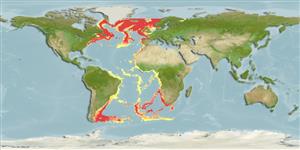इलाज़मौबरांकी (शारक और रेज़) (sharks and rays) >
Squaliformes (Sleeper and dogfish sharks) >
Etmopteridae (Lantern sharks)
Etymology: Centroscyllium: Greek, kentron = sting + Greek, skylla = a kind of shark (Ref. 45335).
Environment: milieu / climate zone / depth range / distribution range
पारिस्थितिकी
समुद्री बाथीड़िमरसल, usually 180 - 2250 m (Ref. 117245). Deep-water; 1°C - 5°C (Ref. 117245); 68°N - 57°S, 99°W - 120°E (Ref. 55215)
Northwest Atlantic: South Baffin Island and Greenland to Virginia, USA and possibly the Gulf of Mexico. Eastern Atlantic: Iceland along Atlantic slope to Senegal; Guinea to Sierra Leone; Namibia to Quoin Point, South Africa (Ref. 5578). Southwest Atlantic: Uruguay to Argentina (Ref. 58839).
Length at first maturity / आकार / वज़न / Age
Maturity: Lm 64.0, range 58 - 70 cm
Max length : 107 cm TL पुल्लिंग / अलिंग; (Ref. ); common length : 84.0 cm TL पुल्लिंग / अलिंग; (Ref. 247); common length :70 cm TL (female)
Adults uniformly blackish; fins of juveniles with white margins (Ref. 6577).
Found on the outermost continental shelves and upper slopes, mostly below 275 m (Ref. 247). Epibenthic-pelagic (Ref. 58426). At high latitudes, may move up to the surface especially during the winter (Ref. 247). Bottom water temp. Are from 3.5 to 4.5°C, but sometimes down to 1°C. Segregation by sex and size as well as by movement into shallower water and by increase in school size is sometimes seen. Feeds on crustaceans, cephalopods, jellyfish and small fishes. Ovoviviparous (Ref. 205), with at least 14 pups in a litter (Ref. 247). Has luminescent organs in skin. May reach 107 cm.
Life cycle and mating behavior
Maturities | पुनरुत्पत्ति | Spawnings | Egg(s) | Fecundities | लार्वा
Distinct pairing with embrace (Ref. 205).
Compagno, L.J.V., 1984. FAO Species Catalogue. Vol. 4. Sharks of the world. An annotated and illustrated catalogue of shark species known to date. Part 1 - Hexanchiformes to Lamniformes. FAO Fish. Synop. 125(4/1):1-249. Rome, FAO. (Ref. 247)
IUCN Red List Status (Ref. 130435)
Threat to humans
Harmless
Human uses
मात्स्यिकी: निर्वाह मात्स्यिकी
साधन
Special reports
Download XML
इंटरनेट स्रोत
Estimates based on models
Preferred temperature (Ref.
123201): 1.6 - 9.9, mean 4.2 °C (based on 219 cells).
Phylogenetic diversity index (Ref.
82804): PD
50 = 0.5078 [Uniqueness, from 0.5 = low to 2.0 = high].
Bayesian length-weight: a=0.00288 (0.00159 - 0.00523), b=3.08 (2.91 - 3.25), in cm total length, based on LWR estimates for this species & (Sub)family-body (Ref.
93245).
Trophic level (Ref.
69278): 3.8 ±0.3 se; based on diet studies.
लौटाव (Ref.
120179): निम्न, न्यूनतम जनसंख्या दुगनी होने का समय 4.5 - 14 वर्ष। (Fec=14).
Fishing Vulnerability (Ref.
59153): High vulnerability (64 of 100).
Climate Vulnerability (Ref.
125649): Moderate vulnerability (38 of 100).
Nutrients (Ref.
124155): Calcium = 6.51 [1.15, 36.11] mg/100g; Iron = 0.304 [0.072, 1.034] mg/100g; Protein = 17.9 [15.9, 20.6] %; Omega3 = 0.262 [0.092, 0.828] g/100g; Selenium = 17.1 [4.9, 53.5] μg/100g; VitaminA = 13.3 [2.5, 68.9] μg/100g; Zinc = 0.352 [0.164, 0.692] mg/100g (wet weight); based on
nutrient studies.
